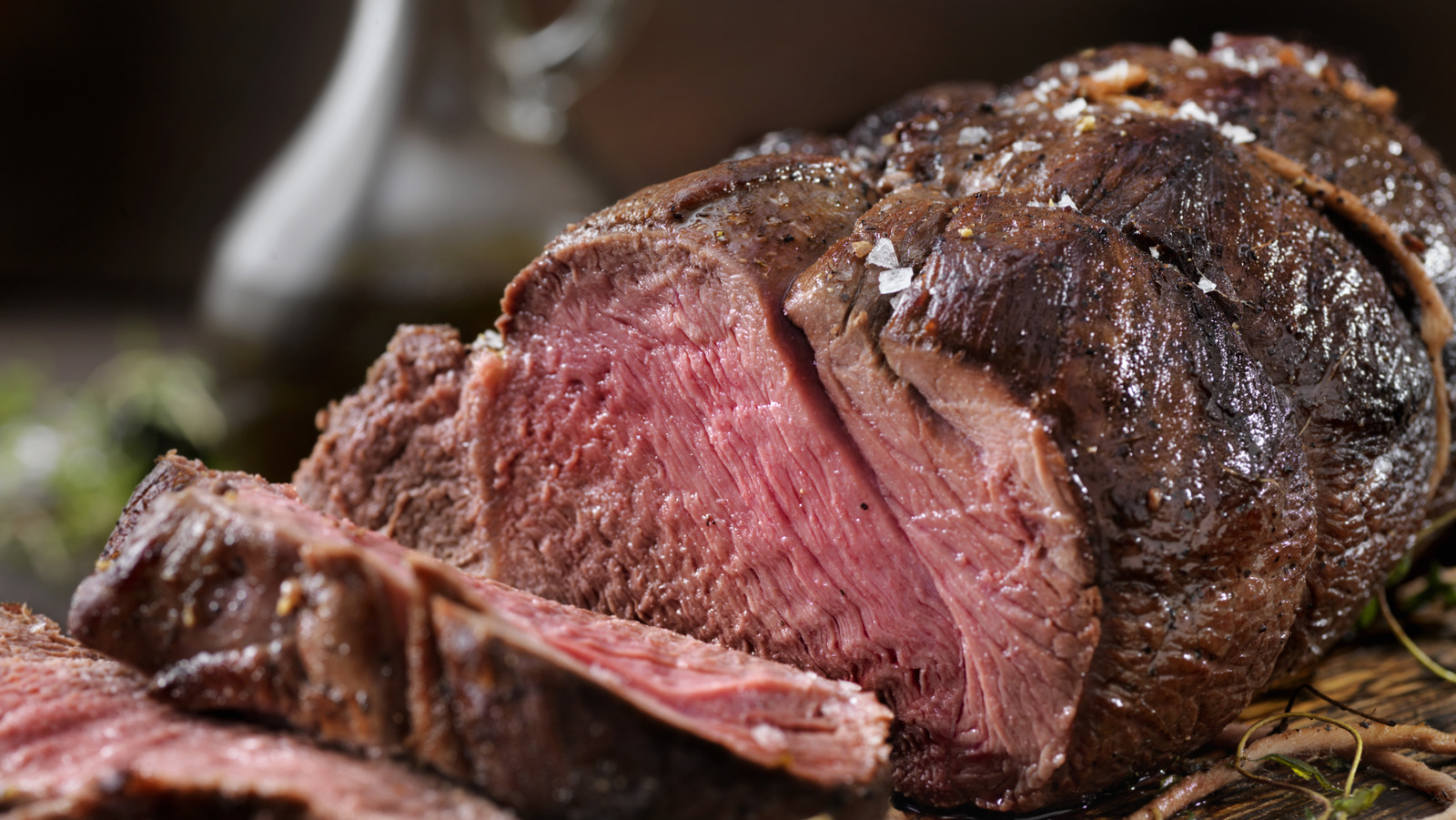Here’s Why You Should Never Substitute Beef For A Cut Of Venison – Tasting Table

Here’s Why You Should Never Substitute Beef For A Cut Of Venison – Tasting Table
Venison is unlike any other type of red meat. Derived from deer, it is a type of game meat that has special characteristics, making it difficult to simply swap it out or substitute it with another kind, especially beef.
Venison is not an industrialized product. While the majority of beef sold around the world has been fed on a diet of corn, grains, grass, and hay, venison is an almost universally wild product. Even deer that are raised on pastured farmland do not share the corn and grain diet of the standard beef cattle. Venison primarily eat foraged grass, herbs, acorns, and other assorted plants. This diet, along with the fact that deer are naturally more active than beef cattle, make venison meat a completely different and unique product.
But what exactly does the diet do for the meat? What an animal consumes has a direct relationship with and impacts the flavor and texture.
There is a vast difference in flavor and texture
 Vladimir Mironov/Getty Images
Vladimir Mironov/Getty Images
A wild or farmed deer has a vastly different lifestyle from that of cattle. They are constantly on the move, and therefore do not develop the high amounts of marbling fat so indicative of quality beef. If you have a venison steak and a beef steak side by side, you will immediately be able to tell the difference between the two.
The venison will be a solid purple-red color, with no marbling fat to be seen, while the beef steak will likely have rivers of opaque fat running through it that provides distinct flavor. But just because venison is relatively devoid of fat does not mean that it is flavorless. On the contrary, venison has an earthy taste, peppered with traces of the acorns and herbs from its diet. And since there is such an absence of fat, venison meat is fine grained and will cook much faster than beef.
Like other lean meat, venison benefits from additional moisture in the form of marinades and is really at its best when cooked to an internal temperature of 145 degrees Fahrenheit or medium rare. So while they may look similar and come in similar cuts, stick to the status quo and keep beef and venison in their respective culinary lanes.
Related News & Content
-

Limit taxonomy terms added to a custom post type
Limit taxonomy terms added to a custom post type,I've created a Custom Post Type and a Custom Taxonomy. In WP Admin, how can I limit amount of taxonomy terms that are added to the custom post type? I want to add no more than one tag into the post. Tags: custom post types custom taxonomy limit stackexchange.com WordPress Development Stack Exchange -

Query top level custom post in taxonomy
Query top level custom post in taxonomy,This is my first post, I'm a bit stuck. I have a custom post (dan) and taxonomy (dnas), with hierarchical categories. I want to make a query resulting in posts at toplevel (hoofdcategorie01, Tags: stackexchange.com taxonomy WordPress Development Stack Exchange wp query -

Gutenberg: Restrict Top Level Blocks, But Not Child Blocks
Gutenberg: Restrict Top Level Blocks, But Not Child Blocks,Background I've created a custom top level "page section" block, to work with my existing theme. I've like to restrict top level blocks to ONLY that one block. However, I don't want to di... Tags: block editor stackexchange.com WordPress Development Stack Exchange -

How do I load styles into the block editor admin screen?
How do I load styles into the block editor admin screen?,The core file 'load-styles.php' generates css styles. Some of the styles interfere with the block editor. I would like to pass in my own style rules that override the styles generated by 'load-styl... Tags: block editor stackexchange.com WordPress Development Stack Exchange -

Installing WordPress in a subdirectory
Installing WordPress in a subdirectory,I am trying to install wordpress into a subdirectory of a website. I simply want to build the client's new site in this subdirectory, so a separate and new WP install in this subdirectory, and the... Tags: installation stackexchange.com WordPress Development Stack Exchange -

Custom theme and plugin updating
Custom theme and plugin updating,History: I'm working on a project for a client that involves building 27 unique websites that are built on wordpress. I say unique, because (for reasons that are not worth going into here) they ar... Tags: automatic updates plugin development stackexchange.com theme development WordPress Development Stack Exchange -

Rewrite nested urls for custom post type
Rewrite nested urls for custom post type,I have a problem with nested permalink. I have a structure of urls like that: Catalog -> Category -> Product My urls are: www.domain.com/catalogs (for archive catalog) www.domain.com/catal... Tags: custom post types stackexchange.com url rewriting WordPress Development Stack Exchange -

Ajax not working to insert, query and result data
Ajax not working to insert, query and result data,On my site, through a form I send/register same information in database, do a SELECT/query and return it! Return the last table saved in database, just that user just entered on the form (along wit... Tags: Ajax database functions plugin development stackexchange.com WordPress Development Stack Exchange -

Israel at war, day 204: Hamas airs video of Israeli hostages, one with U.S. citizenship
Israel at war, day 204: Hamas airs video of Israeli hostages, one with U.S. citizenship,Hamas Studying Israel's Response to Position on Cease-fire Talks Gaza Aid Shipments Resume From Cyprus IDF: Two Palestinians Killed After Firing on IDF Outpost in the West Bank Pro-Palestinian Protest Leader Banned From Columbia Campus Here's What You Need to Know 204 Days Into the War Tags: 2023 Israel Gaza War haaretz.com Israel News -

Carol Kirkwood stuns in figure-hugging dress amid BBC Breakfast technical chaos
Carol Kirkwood stuns in figure-hugging dress amid BBC Breakfast technical chaos,CAROL Kirkwood stunned in a figure-hugging dress amid a technical blunder. BBC Breakfast was flung into chaos this morning after a string of sound issues. However Carol, 61, was all smiles as she p… Tags: BBC BBC Breakfast BBC ONE Carol Kirkwood mirror.co.uk The Scottish Sun TV News TV UK daytime TV -

Families ‘to sue prison’ where loud inmates ‘terrorise kids’ with screaming
Families 'to sue prison' where loud inmates 'terrorise kids' with screaming,Residents living next door to a new prison who say their kids have to sleep wearing headphones and some leave during weekends due to the racket are threatening to sue the prison service Tags: mirror.co.uk Neighbours from hell prisons Scottish government The Mirror -

Doctor Strange’s Secret Wars Role May Be More Important Than You Thought – Looper
Doctor Strange's Secret Wars Role May Be More Important Than You Thought - Looper,According to entertainment leaker Alex Perez, Doctor Strange will find himself confronting his inner struggles as he headlines "Avengers: Secret Wars." Tags: Fiction Looper looper.com Marvel Cinematic Universe Science Star Wars The Universal Monsters franchise -

Choctaw artist Jeffrey Gibson confronts history at US pavilion as its first solo Indigenous artist
Choctaw artist Jeffrey Gibson confronts history at US pavilion as its first solo Indigenous artist,Jeffrey Gibson’s takeover of the U.S. pavilion for this year’s Venice Biennale contemporary art show is a celebration of color, pattern and craft Tags: 109377793 abcnews.go.com Article Entertainment General news Indigenous people Keycat Keytags Race and ethnicity U.S. News visual arts World news -

Mexican film wins top prize at Moscow International Film Festival while major studios boycott Russia
Mexican film wins top prize at Moscow International Film Festival while major studios boycott Russia,A Mexican film has won the top prize at the Moscow International Film Festival which took place as major Western studios boycott the Russian market and as Russia’s war in Ukraine grinds into its third year Tags: 109702159 abcnews.go.com Article Entertainment Fairs and festivals General news Keycat Keytags Movies Russia Ukraine war World news -

Mrs. Laura Diez Barroso and Mr. Carlos Laviada Receive the Prestigious Jeffrey Davidow Good Neighbor Award
Mrs. Laura Diez Barroso and Mr. Carlos Laviada Receive the Prestigious Jeffrey Davidow Good Neighbor Award,/PRNewswire/ -- In recognition of their remarkable dedication to fostering cross-border connectivity and enhancing mobility between the United States and... Tags: Cross Border Xpress PRNewswire prnewswire.com -

Join Els for Autism® in Celebrating World Autism Month: Creating Opportunities for Inclusion and Acceptance of Individuals with Autism Spectrum Disorder
Join Els for Autism® in Celebrating World Autism Month: Creating Opportunities for Inclusion and Acceptance of Individuals with Autism Spectrum Disorder,/PRNewswire/ -- As we prepare to celebrate World Autism Month this April, Els for Autism invites individuals and families to join us in our mission of creating... Tags: Els For Autism Foundation Inc. PRNewswire prnewswire.com -
blueharbor bank Reports First Quarter 2024 Net Income
blueharbor bank Reports First Quarter 2024 Net Income,/PRNewswire/ -- blueharbor bank (the "Bank") today reported net income of $1,336,608 and $0.44 per diluted share for the first quarter of 2024, a decrease of... Tags: blueharbor bank PRNewswire prnewswire.com -

Aktion Associates Acquires Acumatica and Legacy Sage Practice From Canadian-based MNP
Aktion Associates Acquires Acumatica and Legacy Sage Practice From Canadian-based MNP,/PRNewswire/ -- Aktion Associates, Inc., a national software reseller and IT infrastructure provider focused on the Architectural Engineering & Construction,... Tags: Aktion Associates Inc. PRNewswire prnewswire.com
Warning: file_get_contents(https://www.scienceradars.com/wp-output-content.php?pg=1&cat=&kw=&lvl=): Failed to open stream: HTTP request failed! HTTP/1.1 526 in /home/wwwroot/xuenou.com/wp-content/themes/chromenews/template-parts/content.php on line 169
Warning: file_get_contents(https://www.bayuexiang.com/wp-output-content.php?pg=1&cat=&kw=&lvl=): Failed to open stream: HTTP request failed! HTTP/1.1 526 in /home/wwwroot/xuenou.com/wp-content/themes/chromenews/template-parts/content.php on line 173
TrendRadars
The Most Interesting Articles, Mysteries and Discoveries
ABLE National Resource Center Launches 2024 #ABLEtoSave Campaign

Daniel Day-Lewis Loves a Little Carhartt in the Springtime

安倍派4人の全員か一部に「離党勧告」で調整 自民裏金処分 | 毎日新聞




























































